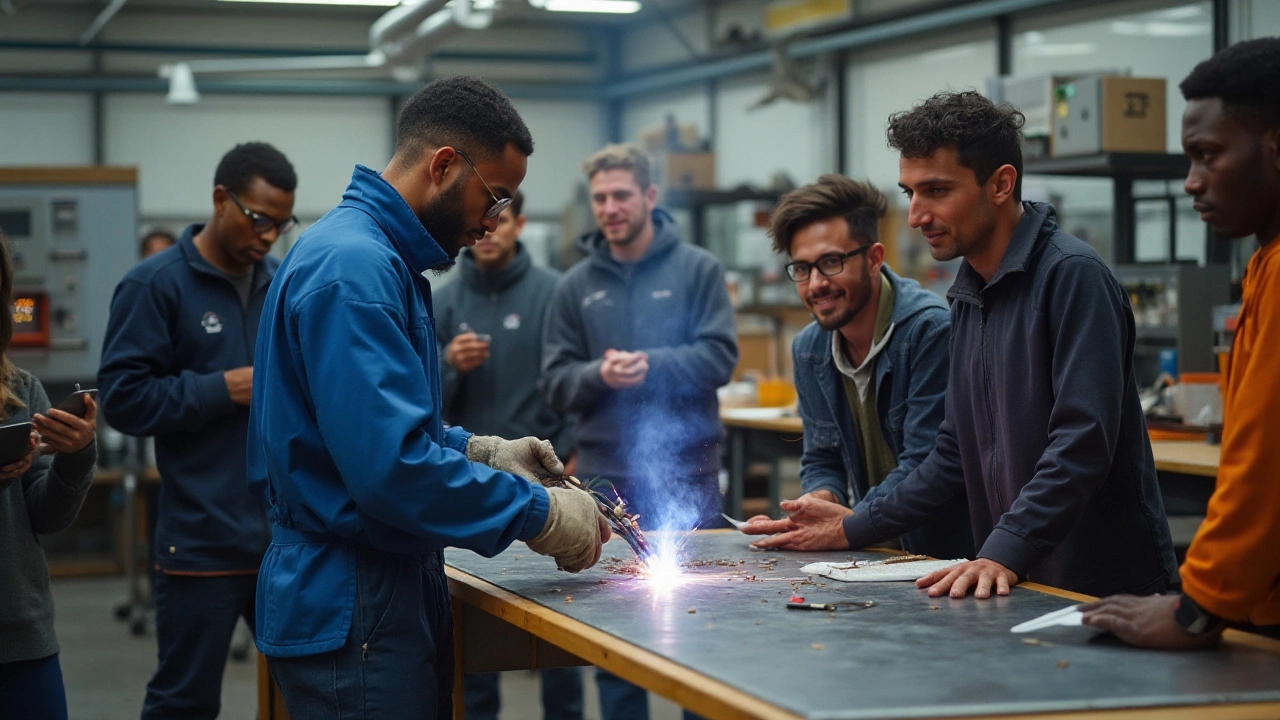Diving into the world of welding opens up a plethora of opportunities, each more exciting than the last. From creating intricate metal art to constructing the skeleton of towering structures, welding skills are highly sought after. But finding the right course that sets you on a path to success can be a daunting task.
With a variety of courses available, ranging from quick certifications to comprehensive degree programs, there is something for everyone. But how do you choose the best one? It's not just about the costs or duration; it's about finding a program that aligns with your career ambitions and learning style.
Delve into this guide to uncover the ins and outs of welding education, insights into what different courses offer, and tips to make the most of your learning experience.
- Understanding Different Welding Courses
- The Importance of Certification
- Skills and Competencies
- Choosing the Right Course for Your Goals
- Learning Formats and Opportunities
- Advanced Tips for Aspiring Welders
Understanding Different Welding Courses
Choosing a welding best course can be a rewarding yet overwhelming decision for those passionate about this craft. This is largely due to the myriad of options available that cater to various skill levels and interests. Short-term certificate programs are very popular among beginners. These often span a few weeks to several months, providing a fundamental grasp of welding techniques and safety practices. They are ideal for those looking to dip their toes into the field without committing to a long-term program.
On the other hand, for individuals aiming for a comprehensive understanding and more significant career prospects, associate degree programs in welding technology are an excellent option. These typically last about two years and cover everything from intricate welding methods to materials science and blueprint reading. These in-depth programs often lead to more opportunities in the industrial sector, enhancing one's employability and skill set.
Certification as a Stepping Stone
For those already familiar with welding certification basics, pursuing specialized certifications can be a game-changer. Courses focused on specific welding processes, such as Gas Tungsten Arc Welding (GTAW) or Shielded Metal Arc Welding (SMAW), offer advanced techniques and allow welders to specialize in specific areas. This expertise can lead to niche career paths in industries like aerospace or underwater welding. According to a report from the American Welding Society, specialized skills make welders more competitive in the job market, providing them with a wider range of employment opportunities.Some welders choose to advance their careers academically by enrolling in bachelor's programs or pursuing degrees in welding engineering. These are generally research-intensive and offer a blend of theoretical and practical learning, preparing graduates for leadership roles or teaching positions. They can also engage in cutting-edge projects related to materials development and industrial design.
Between online courses and traditional classroom settings, learners should consider their personal circumstances when deciding the format of their education. Online courses offer flexibility, allowing busy individuals to learn at their own pace. These programs are particularly beneficial for those balancing work and study or living in regions where physical attendance would be challenging. Many online platforms provide certification upon course completion, ensuring that students are well-prepped to enter the welding field.
Making an informed decision about which pathway to pursue is crucial for long-term career success. It can be tempting to choose a course based solely on cost or location, but understanding what each program specifically offers and how it aligns with personal career goals is key. As American author and motivational speaker Zig Ziglar once said,
"Success is the maximum utilization of the ability that you have."Choosing the right course is about maximizing your potential and setting the foundation for a fulfilling and prosperous career.
The Importance of Certification
In the world of welding, certification stands as a crucial marker of a welder's skill and reliability. While anyone can learn to wield a torch and fuse metals, having an official recognition sets you apart in a competitive industry. Certification is not merely about passing a test; it symbolizes a commitment to quality and safety standards that are essential in professional settings. Employers often prioritize certified welders because they trust that these individuals have met the rigorous standards established by governing bodies like the American Welding Society (AWS) or similar entities in other countries. Without this credential, you might find your opportunities limited, as many companies require — or at least strongly prefer — certified personnel for their projects.
The process of becoming certified usually involves both written and practical exams that test a welder's theoretical knowledge and practical skills. These exams can cover a wide range of techniques and materials, making the certification process as diverse as the field of welding itself. Depending on your interests and career goals, you might pursue certifications in specialized areas such as pipe welding or robotic welding, each with its own set of challenges and rewards. As technology evolves, the demand for specialized skills grows, emphasizing the need for continued education and recertification to keep pace with industry developments.
Moreover, certification can have a positive impact on your earning potential. According to a recent survey, certified welders can earn up to 20% more than their non-certified counterparts. This difference highlights the value that employers place on formally trained individuals. Certification can also open doors to international work opportunities, as many countries recognize certifications from reputable organizations. With the globalization of industries, having a certification can enhance your credibility and employability across borders.
"Certification is the badge of professionalism that every welder should wear proudly," says Thomas Butler, a renowned welding educator.
Additionally, obtaining a welding certification can instill a sense of personal achievement. Welding is not just a job; for many, it's a craft and a passion. Achieving certification validates your hard work and dedication to mastering the trade. It provides a structured learning path, helping you make steady progress from a novice to a skilled professional. This recognition can be especially beneficial for those starting their careers, offering a foundation on which to build further success.
In summary, while welding certification requires time, effort, and sometimes financial investment, the benefits it brings are substantial. From improving job prospects and salary potential to offering personal satisfaction and international opportunities, being a certified welder makes you a more attractive candidate in an industry that values expertise and reliability. Whether you're just beginning your journey in welding or looking to advance your career, certification is a step worth taking.

Skills and Competencies
When embarking on the journey to become a skilled welder, one must focus on developing a robust set of skills and competencies. Welding isn't just about joining pieces of metal; it requires precision, creativity, and a deep understanding of materials and techniques. Aspiring welders need to master several essential welding skills to thrive in this field. The first skill to hone is the technical ability to understand and interpret blueprints and sketches. This ability allows welders to visualize the end product and understand the sequence of tasks necessary to achieve it. This skill is crucial, as even the slightest misread can lead to construction errors that might compromise the integrity of a project.
Technical Skills
The hands-on ability to handle different welding equipment and techniques is equally indispensable. Various welding processes—such as shielded metal arc welding (SMAW), gas tungsten arc welding (GTAW), and gas metal arc welding (GMAW)—each have unique characteristics and applications. Competent welders must know when and how to employ these techniques effectively. Mastery in using these methods leads to quality welds that can withstand significant stress and pressure, making these technical skills a vital part of any welder's repertoire. These skills often improve with practice and experience, turning novice welders into seasoned professionals over time.
Problem-Solving and Critical Thinking
Another key competency is problem-solving and critical thinking. Welding projects often don't go as planned. Materials may not react the way you expect, or environmental conditions could present unforeseen challenges. In these situations, welders must quickly assess the situation, identify the problem, and implement a solution. For instance, if a material shows unanticipated brittleness, a skilled welder will evaluate alternative methods or materials to complete the task without compromising on quality. This skill set makes welders valuable as they can adapt to different work environments and project demands.
Attention to Detail and Safety
Precision and attention to detail can't be understated within the welding industry. A welding bead that isn't perfectly aligned or a joint that isn't properly sealed can be the difference between a masterpiece and a safety hazard. Learning welding also involves acquiring a keen eye for detail and a commitment to consistency. Moreover, adhering strictly to safety procedures is non-negotiable. Working with high temperatures and potential hazards means safety cannot simply be an afterthought; it must be ingrained in a welder's psyche. “Welding requires a rigorous observance of safety protocols to prevent injuries and ensure efficient workflow,” notes a recent report by the American Welding Society.
"Safety in welding is not just about protecting oneself; it's about safeguarding the workplace and the projects we build." – American Welding Society
Soft Skills
Lastly, soft skills also play a crucial role. Communication skills are necessary for collaborating with team members, understanding client needs, and discussing project specifics. These interactions ensure that all involved parties are on the same page, which reduces the chance of errors and increases project efficiency. In addition, having time management skills enables welders to complete projects within specified deadlines, keeping clients happy and maintaining a smooth workflow at the job site.
Building a successful career in welding isn't just a matter of learning techniques; it's about cultivating these skills and competencies through diligent practice, consistent learning, and a commitment to craft excellence. Developing this broad range of skills prepares welders to tackle varied and challenging tasks efficiently and with confidence. These competencies serve as the backbone for a rewarding and sustainable career in the welding industry.
Choosing the Right Course for Your Goals
Venturing into the field of welding means understanding the array of welding programs available and finding the one which aligns with your aspirations. Whether you aim to work in industrial manufacturing or pursue a creative career as a metal artist, selecting the right course is pivotal. The options vary from trade school certifications to associate degrees, each offering its own set of advantages.
Individuals with a specific interest in a particular type of welding, like MIG or TIG, should consider courses that delve deep into those techniques. This ensures you acquire a thorough understanding of the nuances involved. If you're aiming at a career in pipeline construction or aircraft manufacturing, specialized courses tailored to industry-specific techniques will be more beneficial. Research shows that around 83% of employers prefer candidates with qualifications directly related to current market demands, emphasizing the importance of choosing a course that meets industry needs.
Explore Vocational Schools and Colleges
Before narrowing down your options, it's important to explore vocational schools and colleges that offer welding certification programs. These institutions often provide hands-on training, which is invaluable in developing the practical skills necessary in the field. Students who excel in these programs typically have future-ready skills, making them more appealing to potential employers. According to the American Welding Society, students who obtain their certification from a recognized institution observe a significant 20% higher employability rate. One alum shares,
"Attending a reputable welding school gave me not just the skills, but also the confidence to stand out in a competitive market."
Assess the Length of the Course
The length of a welding course should also factor into your decision-making process. While short-term courses might seem appealing for their brevity, it's crucial to weigh what competencies you'll acquire by the end. A brief six-month certification might cover the basics, but for a deep dive into advanced welding techniques, longer programs are often more beneficial. For those balancing work or family commitments, examining the course schedule for flexibility in timings or online learning options can be a game-changer. Evening classes or part-time study might provide the leeway needed to balance personal and educational pursuits.
Investigate Post-Course Opportunities
What happens after the course is almost as important as the contents of the course itself. Do schools offer job placement assistance? Is there an active alumni network? Are there opportunities for internships or apprenticeships? Making connections within the industry is often key to landing your first job. Furthermore, some programs maintain partnerships with major companies for recruitment, streamlining the transition from education to employment. A robust program should offer students both excellent training and guidance on navigating the job market.
Ultimately, finding the right welding course is about aligning it with your personal aspirations and career goals. Take the time to research and consult with industry professionals or graduates, and seek out testimonials where possible. This will not only give you a clearer picture of the course content but also reveal the tangential benefits brought by the program. As you evaluate your options, remember that investing in your education is a step towards securing your career future in the dynamic welding industry.

Learning Formats and Opportunities
When it comes to learning welding, there’s a vast array of formats to suit diverse preferences. In this digital age, traditional boundaries of the classroom have expanded to include online, hybrid, and hands-on approaches. Each format has its own set of benefits, tailored to different learning styles. For instance, those who thrive in a guided classroom setting might seek out a local community college program that offers comprehensive coverage of welding techniques ranging from MIG to TIG. Such programs typically combine theoretical knowledge with extensive hands-on practice, providing students the opportunity to work directly with welding equipment under the supervision of experienced instructors.
Alternatively, if scheduling flexibility is a priority, online and hybrid learning options might better suit your needs. These formats cater to self-directed learners who can manage their time efficiently and have the discipline to engage with digital course materials. Online courses often include video tutorials, detailed lectures, and virtual simulations that introduce foundational concepts. Hybrid courses, on the other hand, blend online learning with in-person lab sessions, offering the best of both worlds. This allows learners to gain theoretical understanding at their convenience, while also acquiring the valuable hands-on experience that is crucial to mastering the art of welding.
For those with an artistic inclination, specialized schools offer programs that focus on metal sculpture and artistic welding. These courses often emphasize creativity, encouraging students to experiment with metals and design their own unique creations. In such environments, the beauty of form and the precision of technique go hand in hand, and graduates often find themselves in high demand in industries like custom fabrication and art installation.
"The future belongs to those who learn more skills and combine them in creative ways," says Robert Greene, a renowned author on mastery.
Finally, don’t overlook the potential for apprenticeships, which provide an immersive learning experience by pairing budding welders with seasoned professionals in real-world settings. This format not only imparts critical skills but also offers a unique opportunity to network within the industry. Apprenticeship programs are particularly useful for gaining insight into the industry's workflow and mastering technical nuances through firsthand experience.
It’s fascinating to note that, according to a 2022 study by the American Welding Society, 80% of professional welders found employment opportunities within a month of completing their training. This statistics illustrates the increasing demand for skilled welders across a multitude of sectors, reinforcing the importance of choosing the right learning path. Whether you’re aiming to build bridges as a part of a large construction team or longing to design intricate art pieces, the right learning format and opportunities can pave the way for a fulfilling and successful career in welding.
Advanced Tips for Aspiring Welders
Embarking on a journey to become a welder is not just about honing the basic skills; it's about expanding your toolkit to include advanced techniques that set you apart in a competitive market. One key aspect of excelling in welding is to continually push your boundaries by practicing diverse welding methods. Each method, whether it be TIG, MIG, or stick welding, offers its own set of challenges and learning them all can significantly enhance your marketability. Make it a point to master each, focusing on the details such as arc stability and metal penetration, which are critical to producing flawless welds. This constant learning process ensures you are ready to tackle any project that comes your way, be it in construction or manufacturing.
"The best investment you can make is in yourself. The more you learn, the more you'll earn." — Warren Buffett
Networking within the welding community often presents hidden opportunities for learning and advancement. Proactively engage in local welding groups or online forums where professionals exchange ideas and solutions. These platforms can be invaluable, offering insights into industry trends and advanced tips from seasoned welders. Consider attending workshops or conferences to meet mentors and expand your knowledge. Collaborating with fellow welders can reveal new techniques and shortcuts that might not be covered in traditional welding courses. Moreover, having industry connections can open doors to job opportunities that you might not find elsewhere, giving you a competitive edge in your job search.
It's vital to maintain a meticulous focus on safety, noted for its importance by welding veterans across the globe. As welding involves dealing with intense heat and potentially hazardous materials, developing a rigorous safety routine is not just smart; it's essential. Regularly check and maintain your equipment. Always adhere to safety protocols, and invest in quality gear like helmets, gloves, and aprons, which can prevent accidents and ensure a safe working environment. Emphasizing safety can lead to fewer disruptions in your work, thus improving efficiency and overall job satisfaction.
Staying updated with technological advancements is another crucial tip for any aspiring welder. With the industry evolving rapidly, it's important to keep abreast of new tools and techniques that can enhance your efficiency and quality of work. For instance, automated and robotic welding tools are becoming increasingly prevalent in large-scale manufacturing. These technologies can increase precision and reduce human error, provided you know how to leverage them. Take online courses or tutorials about new welding technology to stay ahead of the curve. This approach not only boosts your skill set but also makes you a desirable candidate for tech-savvy employers.
Consider specializing in a niche area within welding. As the industry grows, certain fields like underwater welding or aerospace require highly specialized skills. These niche fields often offer lucrative opportunities but require additional certifications and targeted experience. Yet, the investment of time and resources into these specializations can be immensely rewarding long-term, providing you with a unique skill set that is highly valued. Preparing for these roles could include advanced coursework, apprenticeships, or certifications specific to the field.
Lastly, an often-overlooked skill is document management, a helpful companion to technical prowess. Keeping meticulous records of your work—including project details, materials used, and any issues encountered—builds a portfolio that speaks volumes to potential employers. This practice not only helps in refining your skill by reviewing past work but also streamlines the process when it's time to bid on new projects or apply for roles. Your documentation can serve as a tangible testament to your expertise, dedication, and problem-solving abilities, which are qualities every employer looks for in a field as dynamic as welding.





Write a comment